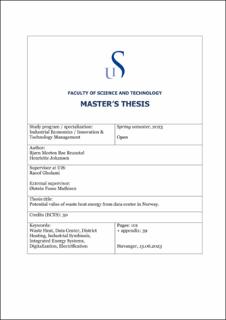| dc.description.abstract | The European Union (EU) has set ambitious climate goals through the European Green Deal, aiming for climate neutrality by 2050. As a result, utilization of waste heat has gained a momentum due to its potential value in society. Data centers are known for their significant power consumption and cooling needs and present an opportunity as a waste heat emitter. This thesis investigates the potential value of waste heat energy from a data center in Norway, with focus on the Green Edge Compute data center in Stavanger.
The thesis assessment considers the context of infrastructure and energy grid distribution, aiming to identify sustainable integrated waste heat solutions. Technical feasibility for integrating waste heat from data centers with district heating systems is examined, considering the low output temperature from the data center and the seasonal variations in supply and demand. Key factors such as environmental impact, community development and economy are evaluated to determine the potential value of waste heat utilization. Due to the relatively new nature of waste heat from data centers through liquid medium, the limited availability of data and previous research in this specific field leads to broad and general findings.
To assess the potential value of waste heat energy from data centers a comprehensive literature review was conducted, selecting a relevant case study from Norway as primary source. Collecting and analyzing data, evaluating value factors, identifying limitations, and proposing a solution for high value were the main steps to contribute to the understanding and implementation of waste heat utilization. Quantitative research was the main method applied. To enhance nuanced analysis because of lacking test data, a small-scale anonymous qualitative study was performed, discussing with industry experts to gather professional insights.
This thesis explores the potential value of waste heat energy from a data center and highlights the significance in achieving energy efficiency, environmental sustainability, and economic benefits. By harnessing waste heat, data centers can reduce their reliance on conventional heating systems, resulting in energy conservation and operational efficiency. Implementing waste heat recovery systems offers advantages such as cost savings, economic growth, and employment possibilities. Integrating waste heat into energy grid systems and promoting collaborative initiatives enhances the value of utilizing waste heat from data centers. | |
